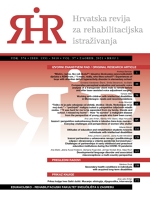Attitudes of education and rehabilitation students towards individuals with intellectual disabilities
Attitudes of education and rehabilitation students towards individuals with intellectual disabilities
Author(s): Milena NikolićSubject(s): Psychology, Higher Education , Inclusive Education / Inclusion
Published by: Sveučilište u Zagrebu, Edukacijsko-rehabilitacijski fakultet
Keywords: attitudes; intellectual disabilities; students; education and rehabilitation;
Summary/Abstract: The attitudes of education and rehabilitation students towards people with intellectual disabilities are very important, because they aim to be future professionals who will provide educational and rehabilitation treatment to these people, as well as advocates for their rights and needs. This study aimed to analyse the attitudes of students towards people with intellectual disabilities and to determine whether their attitudes differed based on self-assessments and sources of knowledge about intellectual disabilities, ways of getting to know a person with intellectual disabilities, and number of years of education. The study involved 100 students undergoing their first cycle of studies at the Faculty for Special Education and Rehabilitation, University of Tuzla. The Mental Retardation Attitude Inventory-Revised (MRAI-R) and a general questionnaire were used in this study. The results show that students express positive attitudes towards people with intellectual disabilities, they are positive about educational integration of these people, and respect their rights. They do not express to need to socially distance from them and do not attribute unfavourable characteristics to these people. There were no differences in attitudes based on self-assessments of knowledge and the sources of knowledge about intellectual disabilities, or the way in which they got to know a person with intellectual disabilities. There was a significant difference in attitudes based on the number of years of education: fourth-year students were observed to express the highest degree of positive attitudes towards people with intellectual disabilities globally and towards the integration of these people in society, and they expressed the lowest level of social distance. Given the small sample of research subjects, as well as the fact that the study involved students of one education and rehabilitation faculty, in Bosnia and Herzegovina, the results obtained and the conclusions derived from them should be considered with caution. Future research should include a larger sample of education and rehabilitation students to verify the results obtained in this study.
Journal: Hrvatska revija za rehabilitacijska istraživanja
- Issue Year: 57/2021
- Issue No: 1
- Page Range: 116-127
- Page Count: 12
- Language: English

